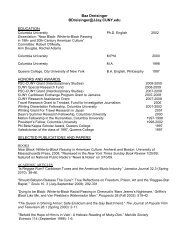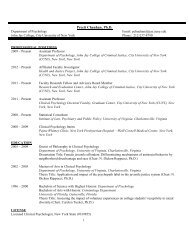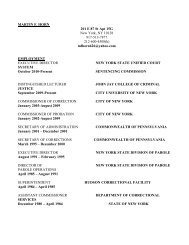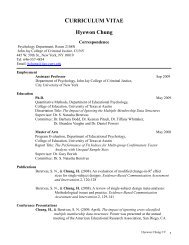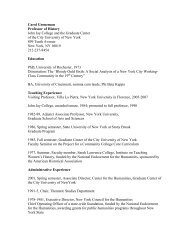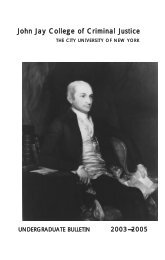Bulletin - John Jay College Of Criminal Justice - CUNY
Bulletin - John Jay College Of Criminal Justice - CUNY
Bulletin - John Jay College Of Criminal Justice - CUNY
You also want an ePaper? Increase the reach of your titles
YUMPU automatically turns print PDFs into web optimized ePapers that Google loves.
APPENDIX<br />
(It is strongly recommended that the faculty member should<br />
report all such incidents by completing and submitting the form<br />
to the chief student affairs officer, the Academic Integrity<br />
Committee if the college has established one (see<br />
recommendation below), or other appropriate academic integrity<br />
official whom the college may designate (collectively referred to<br />
hereinafter as the “Academic Integrity <strong>Of</strong>ficial”). A follow-up<br />
form should be submitted to the student’s academic integrity file<br />
by the adjudicating person or body once the suspected incident<br />
has been resolved pursuant to one of the methods described<br />
below. Although forms need not be uniform across the<br />
University, they need to be uniform within each college. The<br />
form should provide at least minimal information such as the<br />
name of the instructor and student, course name and number,<br />
date of incident, explanation of incident and the instructor’s<br />
telephone/email contact information; it should be easy to use<br />
and process. Except as otherwise provided in the <strong>CUNY</strong><br />
Procedures, the Academic Integrity <strong>Of</strong>ficial of each college<br />
should retain the forms for the purposes of identifying repeat<br />
offenders, gathering data and assessing and reviewing policies.<br />
• <strong>CUNY</strong> will develop a website on Academic Integrity. This<br />
website will include suggestions for faculty, students and<br />
administrators to reduce cheating or plagiarism, resources on<br />
academic integrity and links to relevant sites. Future plans also<br />
include the development of an online training program to raise<br />
awareness about academic integrity.<br />
• The Committee recommends that this <strong>CUNY</strong> Policy on<br />
Academic Integrity, dated Spring 2004, be adopted by the Board<br />
of Trustees.<br />
• <strong>College</strong>s should adopt the “PEN” (Pending) grade to facilitate<br />
the implementation of the Procedures for Imposition of<br />
Sanctions. This grade already exists in the University’s Glossary<br />
of Grades.<br />
• <strong>College</strong>s may wish to consider issuing a Student Guide to<br />
Academic Integrity. An excellent example is a document that<br />
students at Baruch <strong>College</strong> developed called Student Guide to<br />
Academic Integrity at Baruch <strong>College</strong>. The Guide is in its final<br />
stages of approval.<br />
• Each college should consider joining the Center for Academic<br />
Integrity.<br />
• <strong>College</strong>s should consider subscribing to an electronic plagiarism<br />
detection service. Any college that does subscribe must notify<br />
every student each semester of the fact that such a service is<br />
available for use by the faculty.<br />
• <strong>College</strong>s should consider establishing an Academic Integrity<br />
Committee, to serve in lieu of grade appeals committees in cases<br />
of academic dishonesty, which would hear and decide contested<br />
grade reductions that faculty members award because of<br />
students violations of the Academic Integrity Policy and collect<br />
and maintain files of Faculty Report forms of suspected and<br />
adjudicated violations of the Academic Integrity Policy.<br />
• Establish a mechanism for preventing students from dropping a<br />
class in order to avoid an investigation and/or imposition of a<br />
sanction for a violation of academic integrity.<br />
III. PROCEDURES FOR IMPOSITION OF SANCTIONS FOR<br />
VIOLATIONS OF <strong>CUNY</strong> POLICY ON ACADEMIC<br />
INTEGRITY<br />
A. Introduction<br />
As a legal matter, in disciplining students for violations of policies of<br />
academic integrity, <strong>CUNY</strong>, as a public institution, must conform to<br />
the principles of due process mandated by the Fourteenth<br />
Amendment to the United States Constitution — generally speaking,<br />
to provide notice of the charges and some opportunity to be heard. In<br />
the context of court-litigated violations, questions as to how much<br />
and what kind of process was “due” turn on the courts’ judgment<br />
whether the decision on culpability was “disciplinary” (a question of<br />
fact) or “academic” (a question of the instructor’s expert judgment).<br />
This distinction has proved difficult to apply on campus.<br />
311



